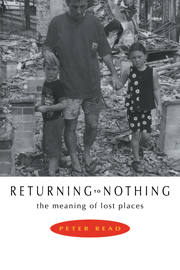Book contents
- Frontmatter
- Contents
- Dedication
- Preface
- Acknowledgments
- 1 Losing Windermere Station
- 2 Vanished Homelands
- 3 Namadgi: Sharing the High Country
- 4 Two Dead Towns
- 5 Home: The Heart of the Matter
- 6 Empty Spaces: The Inundation of Lake Pedder
- 7 Darwin Rebuilt
- 8 Losing a Neighbourhood
- 9 That Place
- Notes
- References
- Index
2 - Vanished Homelands
Published online by Cambridge University Press: 05 November 2011
- Frontmatter
- Contents
- Dedication
- Preface
- Acknowledgments
- 1 Losing Windermere Station
- 2 Vanished Homelands
- 3 Namadgi: Sharing the High Country
- 4 Two Dead Towns
- 5 Home: The Heart of the Matter
- 6 Empty Spaces: The Inundation of Lake Pedder
- 7 Darwin Rebuilt
- 8 Losing a Neighbourhood
- 9 That Place
- Notes
- References
- Index
Summary
In August 1993 Luka Prkan left Canberra to return to his birth country of Croatia. He had emigrated in the 1960s, and had returned to Yugoslavia with pleasure several times, but the civil war of the 1990s made this homecoming agonising. He made his way to his birthplace, the family home for 600 years, to find it in ruins, rubble, block on shattered block. Pieces of window, half a door, a twisted iron bedframe. Half the outside staircase pointed to nothing. The enormous stove which had kept his family warm when he was a child had vanished. Donkeys, turkeys, geese, pigs, all the farm animals slaughtered; other once-domesticated animals charged past in terror. The ruin seemed so small and pitiful. Lost homelands are dead localities.
Lost countries are dead people. Luka Prkan's father died in the 1970s and his brother was wounded by a mortar splinter during the civil war. His mother, who had somehow survived the mortar attack on her home, had at first refused to leave the ruin. He found her in the refugee camp to which she had been escorted. He was not sure whether she knew him or not. It was said that from time to time she scrambled back to the wreckage of the family home, to be extricated from the stone fragments and returned to the refugee camp.
- Type
- Chapter
- Information
- Returning to NothingThe Meaning of Lost Places, pp. 25 - 51Publisher: Cambridge University PressPrint publication year: 1996



